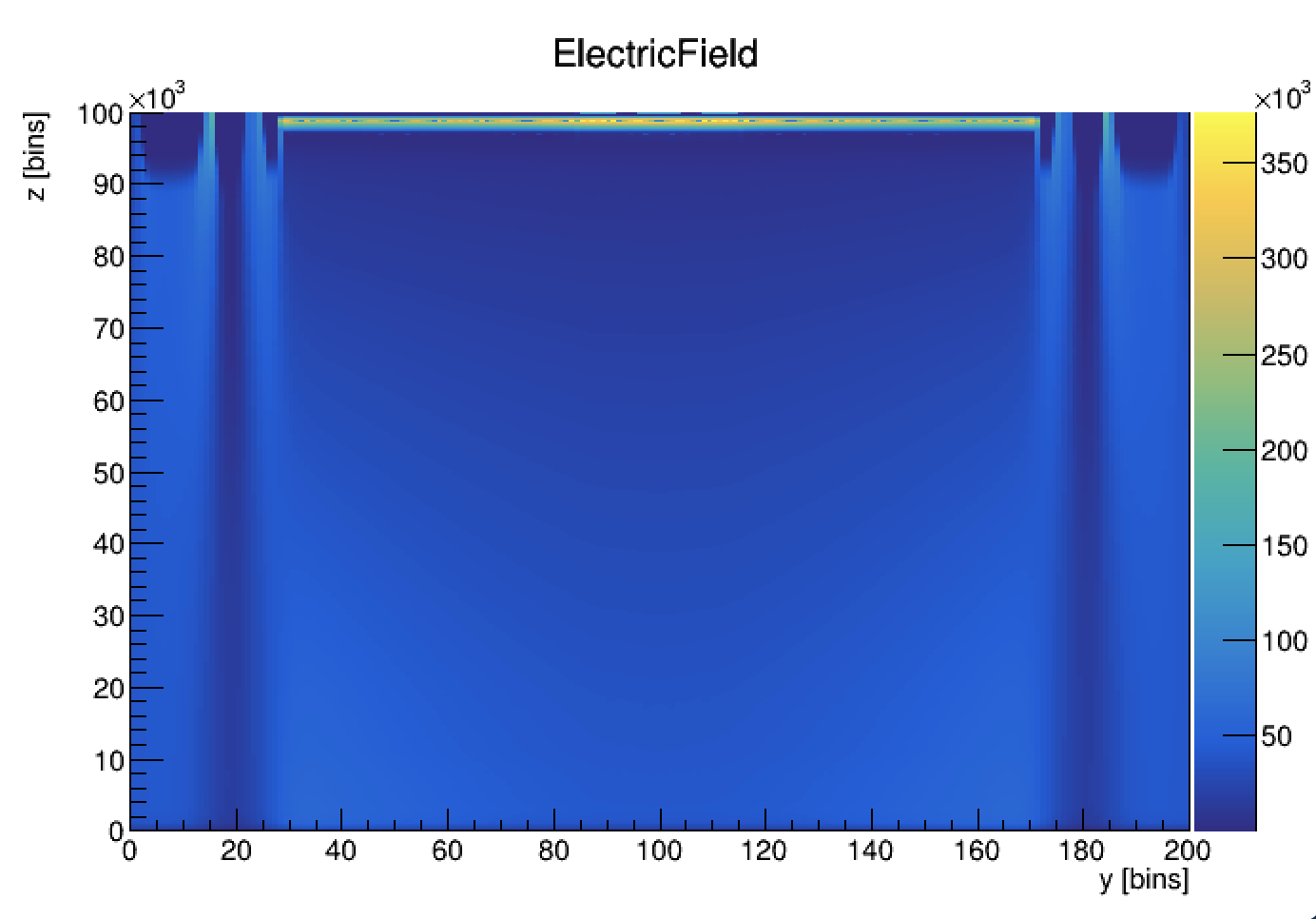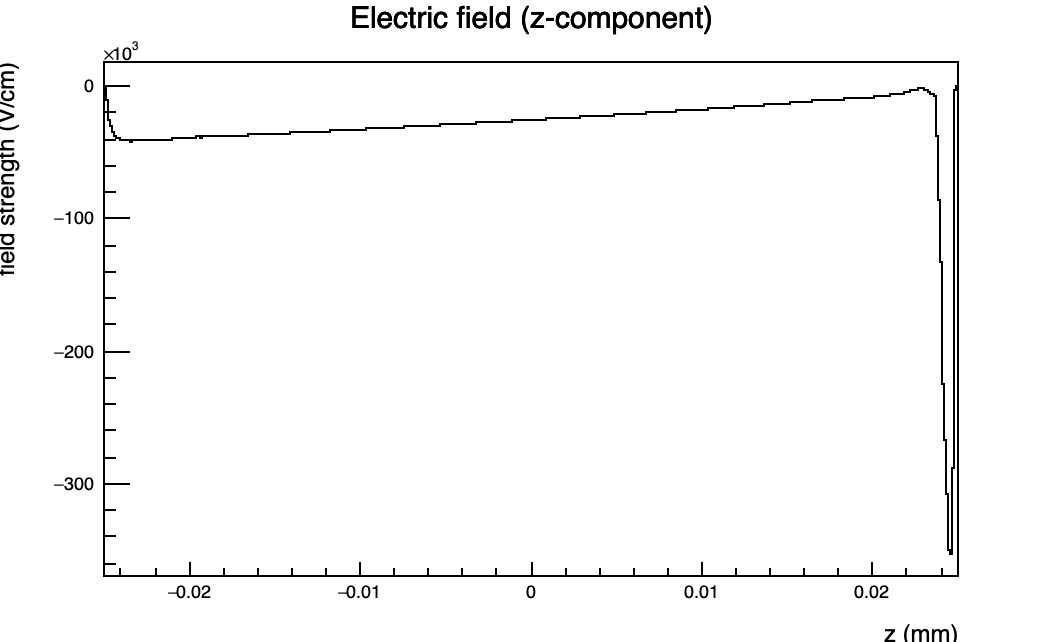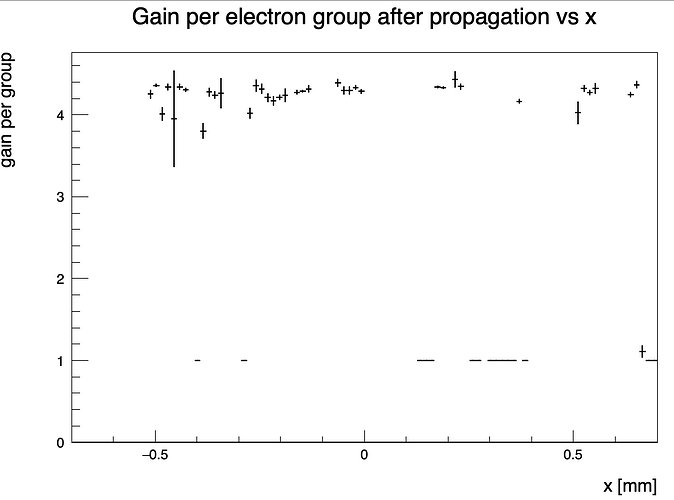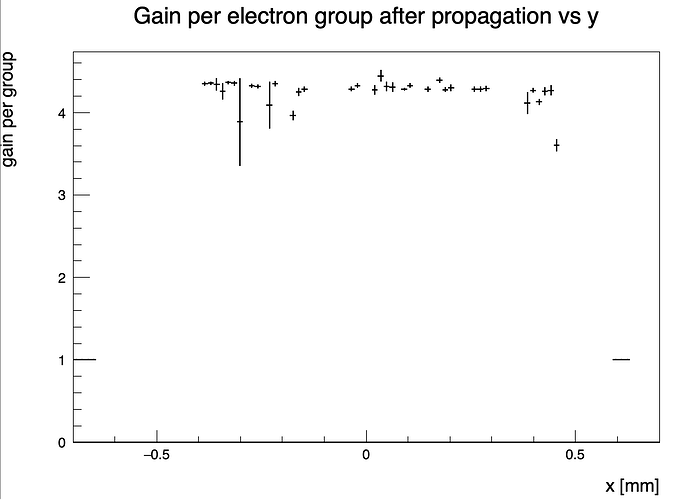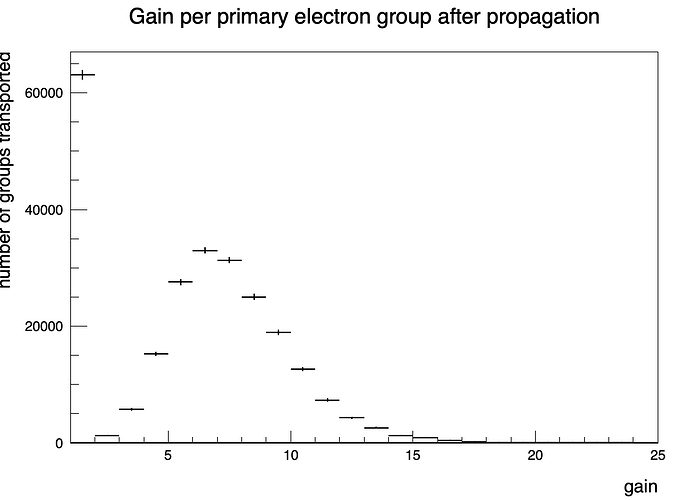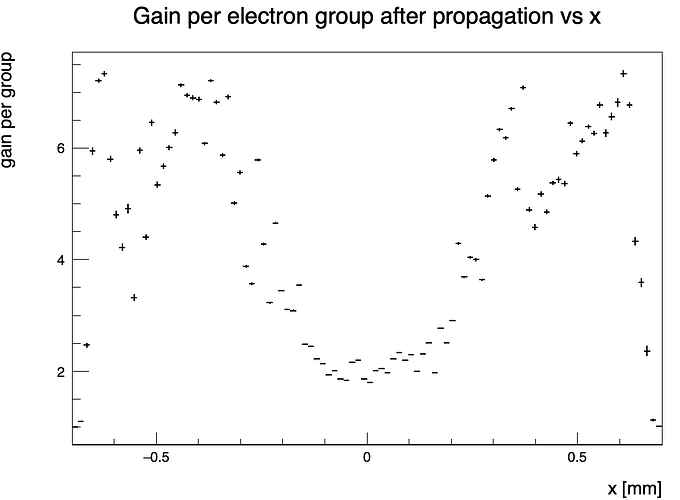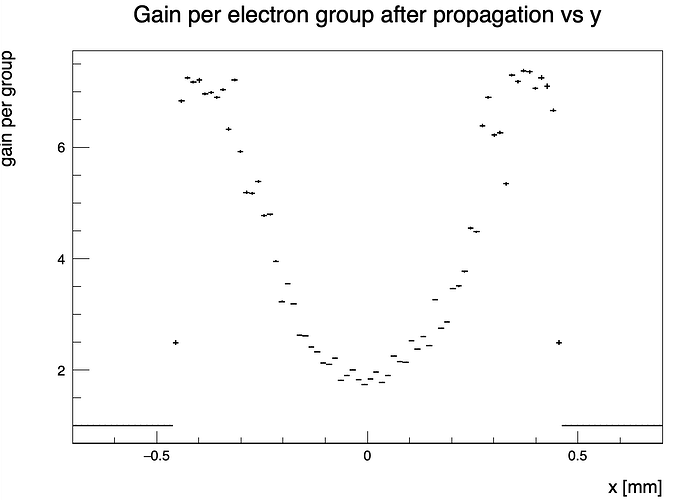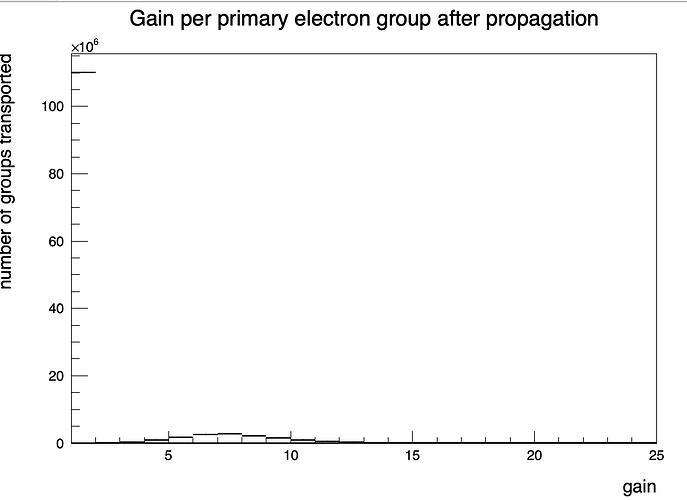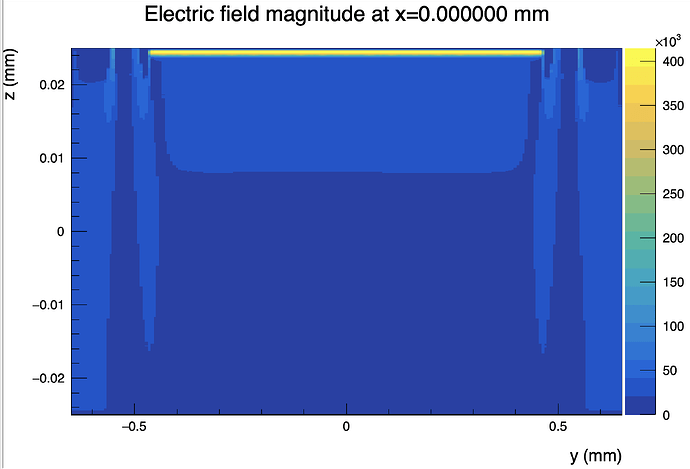Dear @simonspa ,
Thank you for your reply! I forgot to mention that I use MacOS system, and find some problem in using GDB to run it.
Unable to find Mach task port for process-id 88940: (os/kern) failure (0x5).
(please check gdb is codesigned - see taskgated(8))
Can I use lldb with the command “lldb – …/install/bin/allpix -c lgad.conf”? If it is also OK, all the outputs are here!
(lldb) thread backtrace all
* thread #1, queue = 'com.apple.main-thread', stop reason = signal SIGABRT
* frame #0: 0x00007ff8185afffe libsystem_kernel.dylib`__pthread_kill + 10
frame #1: 0x00007ff8185e61ff libsystem_pthread.dylib`pthread_kill + 263
frame #2: 0x00007ff818531d14 libsystem_c.dylib`abort + 123
frame #3: 0x00000001083134fc libCore.6.30.so`TUnixSystem::Abort(int) + 28
frame #4: 0x00000001081edb32 libCore.6.30.so`DefaultErrorHandler(int, bool, char const*, char const*) + 1778
frame #5: 0x00000001082a72f7 libCore.6.30.so`ErrorHandler + 679
frame #6: 0x00000001082020e7 libCore.6.30.so`TObject::Fatal(char const*, char const*, ...) const + 151
frame #7: 0x00000001081d99a9 libCore.6.30.so`TBuffer::AutoExpand(int) + 105
frame #8: 0x0000000107977f1b libRIO.6.30.so`TBufferFile::WriteFastArray(double const*, int) + 59
frame #9: 0x00000001079fc9f9 libRIO.6.30.so`TGenCollectionStreamer::WritePrimitives(int, TBuffer&) + 377
frame #10: 0x00000001079c029d libRIO.6.30.so`TCollectionClassStreamer::Stream(TBuffer&, void*, TClass const*) + 93
frame #11: 0x00000001079783e4 libRIO.6.30.so`TBufferFile::WriteFastArray(void*, TClass const*, int, TMemberStreamer*) + 116
frame #12: 0x0000000107b95e0b libRIO.6.30.so`int TStreamerInfo::WriteBufferAux<char**>(TBuffer&, char** const&, TStreamerInfo::TCompInfo* const*, int, int, int, int, int) + 13915
frame #13: 0x0000000107a35072 libRIO.6.30.so`TStreamerInfoActions::GenericWriteAction(TBuffer&, void*, TStreamerInfoActions::TConfiguration const*) + 66
frame #14: 0x000000010797af4d libRIO.6.30.so`TBufferFile::ApplySequence(TStreamerInfoActions::TActionSequence const&, void*) + 109
frame #15: 0x000000010797adef libRIO.6.30.so`TBufferFile::WriteClassBuffer(TClass const*, void*) + 479
frame #16: 0x00000001079783e4 libRIO.6.30.so`TBufferFile::WriteFastArray(void*, TClass const*, int, TMemberStreamer*) + 116
frame #17: 0x0000000107b9da09 libRIO.6.30.so`int TStreamerInfo::WriteBufferAux<TVirtualCollectionProxy>(TBuffer&, TVirtualCollectionProxy const&, TStreamerInfo::TCompInfo* const*, int, int, int, int, int) + 5241
frame #18: 0x0000000107a5fd51 libRIO.6.30.so`TStreamerInfoActions::GenericLooper::GenericWrite(TBuffer&, void*, void const*, TStreamerInfoActions::TLoopConfiguration const*, TStreamerInfoActions::TConfiguration const*) + 81
frame #19: 0x000000010797b0c6 libRIO.6.30.so`TBufferFile::ApplySequence(TStreamerInfoActions::TActionSequence const&, void*, void*) + 134
frame #20: 0x0000000107b95cc4 libRIO.6.30.so`int TStreamerInfo::WriteBufferAux<char**>(TBuffer&, char** const&, TStreamerInfo::TCompInfo* const*, int, int, int, int, int) + 13588
frame #21: 0x0000000107a35072 libRIO.6.30.so`TStreamerInfoActions::GenericWriteAction(TBuffer&, void*, TStreamerInfoActions::TConfiguration const*) + 66
frame #22: 0x000000010797af4d libRIO.6.30.so`TBufferFile::ApplySequence(TStreamerInfoActions::TActionSequence const&, void*) + 109
frame #23: 0x000000010797adef libRIO.6.30.so`TBufferFile::WriteClassBuffer(TClass const*, void*) + 479
frame #24: 0x0000000107978e31 libRIO.6.30.so`TBufferFile::WriteObjectClass(void const*, TClass const*, bool) + 385
frame #25: 0x000000010797f42c libRIO.6.30.so`TBufferIO::WriteObjectAny(void const*, TClass const*, bool) + 316
frame #26: 0x00000001079c5443 libRIO.6.30.so`TEmulatedCollectionProxy::WriteItems(int, TBuffer&) + 483
frame #27: 0x00000001079c029d libRIO.6.30.so`TCollectionClassStreamer::Stream(TBuffer&, void*, TClass const*) + 93
frame #28: 0x00000001079783e4 libRIO.6.30.so`TBufferFile::WriteFastArray(void*, TClass const*, int, TMemberStreamer*) + 116
frame #29: 0x0000000107b95e0b libRIO.6.30.so`int TStreamerInfo::WriteBufferAux<char**>(TBuffer&, char** const&, TStreamerInfo::TCompInfo* const*, int, int, int, int, int) + 13915
frame #30: 0x0000000107a35072 libRIO.6.30.so`TStreamerInfoActions::GenericWriteAction(TBuffer&, void*, TStreamerInfoActions::TConfiguration const*) + 66
frame #31: 0x000000010797af4d libRIO.6.30.so`TBufferFile::ApplySequence(TStreamerInfoActions::TActionSequence const&, void*) + 109
frame #32: 0x0000000103966117 libTree.6.30.so`TBranch::FillImpl(ROOT::Internal::TBranchIMTHelper*) + 391
frame #33: 0x0000000103972484 libTree.6.30.so`TBranchElement::FillImpl(ROOT::Internal::TBranchIMTHelper*) + 244
frame #34: 0x00000001039cf606 libTree.6.30.so`TTree::Fill() + 694
frame #35: 0x00000001006814cd libAllpixModuleROOTObjectWriter.dylib`allpix::ROOTObjectWriterModule::run(this=0x0000000126769e10, event=<unavailable>) at ROOTObjectWriterModule.cpp:232:22 [opt]
frame #36: 0x0000000105eae3b0 libAllpixCore.dylib`void allpix::ModuleManager::run(this=0x00006000033f3208, event=std::__1::shared_ptr<allpix::Event>::element_type @ 0x000000012a5b18f8 strong=1 weak=1, module_iter=std::__1::list<std::__1::shared_ptr<allpix::Module>, std::__1::allocator<std::__1::shared_ptr<allpix::Module> > >::iterator @ 0x00007ff7bfefdfb0, event_time=0, self_func=0x00006000033f3258)::$_1::operator()<$_1&>(std::__1::shared_ptr<allpix::Event>, std::__1::__list_iterator<std::__1::shared_ptr<allpix::Module>, void*>, long long, $_1&) at ModuleManager.cpp:816:33 [opt]
frame #37: 0x0000000105eadc1c libAllpixCore.dylib`std::__1::__packaged_task_func<std::__1::__bind<std::__1::__bind<allpix::ModuleManager::run(allpix::RandomNumberGenerator&)::$_1&, std::nullptr_t, std::__1::__list_iterator<std::__1::shared_ptr<allpix::Module>, void*>, int, allpix::ModuleManager::run(allpix::RandomNumberGenerator&)::$_1&>&>, std::__1::allocator<std::__1::__bind<std::__1::__bind<allpix::ModuleManager::run(allpix::RandomNumberGenerator&)::$_1&, std::nullptr_t, std::__1::__list_iterator<std::__1::shared_ptr<allpix::Module>, void*>, int, allpix::ModuleManager::run(allpix::RandomNumberGenerator&)::$_1&>&> >, void ()>::operator()() [inlined] decltype(__f=<unavailable>, __args=<unavailable>, __args=<unavailable>, __args=<unavailable>)::$_1&>(fp)(static_cast<std::nullptr_t&>(fp0), static_cast<std::__1::__list_iterator<std::__1::shared_ptr<allpix::Module>, void*>&>(fp0), static_cast<int&>(fp0), static_cast<allpix::ModuleManager::run(allpix::RandomNumberGenerator&)::$_1&>(fp0))) std::__1::__invoke<allpix::ModuleManager::run(allpix::RandomNumberGenerator&)::$_1&, std::nullptr_t&, std::__1::__list_iterator<std::__1::shared_ptr<allpix::Module>, void*>&, int&, allpix::ModuleManager::run(allpix::RandomNumberGenerator&)::$_1&>(allpix::ModuleManager::run(allpix::RandomNumberGenerator&)::$_1&, std::nullptr_t&, std::__1::__list_iterator<std::__1::shared_ptr<allpix::Module>, void*>&, int&, allpix::ModuleManager::run(allpix::RandomNumberGenerator&)::$_1&) at type_traits:3918:1 [opt]
frame #38: 0x0000000105eadc01 libAllpixCore.dylib`std::__1::__packaged_task_func<std::__1::__bind<std::__1::__bind<allpix::ModuleManager::run(allpix::RandomNumberGenerator&)::$_1&, std::nullptr_t, std::__1::__list_iterator<std::__1::shared_ptr<allpix::Module>, void*>, int, allpix::ModuleManager::run(allpix::RandomNumberGenerator&)::$_1&>&>, std::__1::allocator<std::__1::__bind<std::__1::__bind<allpix::ModuleManager::run(allpix::RandomNumberGenerator&)::$_1&, std::nullptr_t, std::__1::__list_iterator<std::__1::shared_ptr<allpix::Module>, void*>, int, allpix::ModuleManager::run(allpix::RandomNumberGenerator&)::$_1&>&> >, void ()>::operator()() [inlined] std::__1::__bind_return<allpix::ModuleManager::run(allpix::RandomNumberGenerator&)::$_1, std::__1::tuple<std::nullptr_t, std::__1::__list_iterator<std::__1::shared_ptr<allpix::Module>, void*>, int, allpix::ModuleManager::run(allpix::RandomNumberGenerator&)::$_1>, std::__1::tuple<>, __is_valid_bind_return<allpix::ModuleManager::run(allpix::RandomNumberGenerator&)::$_1, std::__1::tuple<std::nullptr_t, std::__1::__list_iterator<std::__1::shared_ptr<allpix::Module>, void*>, int, allpix::ModuleManager::run(allpix::RandomNumberGenerator&)::$_1>, std::__1::tuple<> >::value>::type std::__1::__apply_functor<allpix::ModuleManager::run(__f=<unavailable>, __bound_args=<unavailable>)::$_1, std::__1::tuple<std::nullptr_t, std::__1::__list_iterator<std::__1::shared_ptr<allpix::Module>, void*>, int, allpix::ModuleManager::run(allpix::RandomNumberGenerator&)::$_1>, 0ul, 1ul, 2ul, 3ul, std::__1::tuple<> >(allpix::ModuleManager::run(allpix::RandomNumberGenerator&)::$_1&, std::__1::tuple<std::nullptr_t, std::__1::__list_iterator<std::__1::shared_ptr<allpix::Module>, void*>, int, allpix::ModuleManager::run(allpix::RandomNumberGenerator&)::$_1>&, std::__1::__tuple_indices<0ul, 1ul, 2ul, 3ul>, std::__1::tuple<>&&) at bind.h:257:12 [opt]
frame #39: 0x0000000105eadbfd libAllpixCore.dylib`std::__1::__packaged_task_func<std::__1::__bind<std::__1::__bind<allpix::ModuleManager::run(allpix::RandomNumberGenerator&)::$_1&, std::nullptr_t, std::__1::__list_iterator<std::__1::shared_ptr<allpix::Module>, void*>, int, allpix::ModuleManager::run(allpix::RandomNumberGenerator&)::$_1&>&>, std::__1::allocator<std::__1::__bind<std::__1::__bind<allpix::ModuleManager::run(allpix::RandomNumberGenerator&)::$_1&, std::nullptr_t, std::__1::__list_iterator<std::__1::shared_ptr<allpix::Module>, void*>, int, allpix::ModuleManager::run(allpix::RandomNumberGenerator&)::$_1&>&> >, void ()>::operator()() [inlined] std::__1::__bind_return<allpix::ModuleManager::run(allpix::RandomNumberGenerator&)::$_1, std::__1::tuple<std::nullptr_t, std::__1::__list_iterator<std::__1::shared_ptr<allpix::Module>, void*>, int, allpix::ModuleManager::run(allpix::RandomNumberGenerator&)::$_1>, std::__1::tuple<>, __is_valid_bind_return<allpix::ModuleManager::run(allpix::RandomNumberGenerator&)::$_1, std::__1::tuple<std::nullptr_t, std::__1::__list_iterator<std::__1::shared_ptr<allpix::Module>, void*>, int, allpix::ModuleManager::run(allpix::RandomNumberGenerator&)::$_1>, std::__1::tuple<> >::value>::type std::__1::__bind<allpix::ModuleManager::run(this=<unavailable>)::$_1&, std::nullptr_t, std::__1::__list_iterator<std::__1::shared_ptr<allpix::Module>, void*>, int, allpix::ModuleManager::run(allpix::RandomNumberGenerator&)::$_1&>::operator()<>() at bind.h:292:20 [opt]
frame #40: 0x0000000105eadbf4 libAllpixCore.dylib`std::__1::__packaged_task_func<std::__1::__bind<std::__1::__bind<allpix::ModuleManager::run(allpix::RandomNumberGenerator&)::$_1&, std::nullptr_t, std::__1::__list_iterator<std::__1::shared_ptr<allpix::Module>, void*>, int, allpix::ModuleManager::run(allpix::RandomNumberGenerator&)::$_1&>&>, std::__1::allocator<std::__1::__bind<std::__1::__bind<allpix::ModuleManager::run(allpix::RandomNumberGenerator&)::$_1&, std::nullptr_t, std::__1::__list_iterator<std::__1::shared_ptr<allpix::Module>, void*>, int, allpix::ModuleManager::run(allpix::RandomNumberGenerator&)::$_1&>&> >, void ()>::operator()() [inlined] decltype(__f=<unavailable>)::$_1&, std::nullptr_t, std::__1::__list_iterator<std::__1::shared_ptr<allpix::Module>, void*>, int, allpix::ModuleManager::run(allpix::RandomNumberGenerator&)::$_1&>&>(fp)()) std::__1::__invoke<std::__1::__bind<allpix::ModuleManager::run(allpix::RandomNumberGenerator&)::$_1&, std::nullptr_t, std::__1::__list_iterator<std::__1::shared_ptr<allpix::Module>, void*>, int, allpix::ModuleManager::run(allpix::RandomNumberGenerator&)::$_1&>&>(std::__1::__bind<allpix::ModuleManager::run(allpix::RandomNumberGenerator&)::$_1&, std::nullptr_t, std::__1::__list_iterator<std::__1::shared_ptr<allpix::Module>, void*>, int, allpix::ModuleManager::run(allpix::RandomNumberGenerator&)::$_1&>&) at type_traits:3918:1 [opt]
frame #41: 0x0000000105eadbf4 libAllpixCore.dylib`std::__1::__packaged_task_func<std::__1::__bind<std::__1::__bind<allpix::ModuleManager::run(allpix::RandomNumberGenerator&)::$_1&, std::nullptr_t, std::__1::__list_iterator<std::__1::shared_ptr<allpix::Module>, void*>, int, allpix::ModuleManager::run(allpix::RandomNumberGenerator&)::$_1&>&>, std::__1::allocator<std::__1::__bind<std::__1::__bind<allpix::ModuleManager::run(allpix::RandomNumberGenerator&)::$_1&, std::nullptr_t, std::__1::__list_iterator<std::__1::shared_ptr<allpix::Module>, void*>, int, allpix::ModuleManager::run(allpix::RandomNumberGenerator&)::$_1&>&> >, void ()>::operator()() [inlined] std::__1::__bind_return<std::__1::__bind<allpix::ModuleManager::run(allpix::RandomNumberGenerator&)::$_1&, std::nullptr_t, std::__1::__list_iterator<std::__1::shared_ptr<allpix::Module>, void*>, int, allpix::ModuleManager::run(allpix::RandomNumberGenerator&)::$_1&>, std::__1::tuple<>, std::__1::tuple<>, __is_valid_bind_return<std::__1::__bind<allpix::ModuleManager::run(allpix::RandomNumberGenerator&)::$_1&, std::nullptr_t, std::__1::__list_iterator<std::__1::shared_ptr<allpix::Module>, void*>, int, allpix::ModuleManager::run(allpix::RandomNumberGenerator&)::$_1&>, std::__1::tuple<>, std::__1::tuple<> >::value>::type std::__1::__apply_functor<std::__1::__bind<allpix::ModuleManager::run(__f=<unavailable>)::$_1&, std::nullptr_t, std::__1::__list_iterator<std::__1::shared_ptr<allpix::Module>, void*>, int, allpix::ModuleManager::run(allpix::RandomNumberGenerator&)::$_1&>, std::__1::tuple<>, std::__1::tuple<> >(std::__1::__bind<allpix::ModuleManager::run(allpix::RandomNumberGenerator&)::$_1&, std::nullptr_t, std::__1::__list_iterator<std::__1::shared_ptr<allpix::Module>, void*>, int, allpix::ModuleManager::run(allpix::RandomNumberGenerator&)::$_1&>&, std::__1::tuple<>&, std::__1::__tuple_indices<>, std::__1::tuple<>&&) at bind.h:257:12 [opt]
frame #42: 0x0000000105eadbf4 libAllpixCore.dylib`std::__1::__packaged_task_func<std::__1::__bind<std::__1::__bind<allpix::ModuleManager::run(allpix::RandomNumberGenerator&)::$_1&, std::nullptr_t, std::__1::__list_iterator<std::__1::shared_ptr<allpix::Module>, void*>, int, allpix::ModuleManager::run(allpix::RandomNumberGenerator&)::$_1&>&>, std::__1::allocator<std::__1::__bind<std::__1::__bind<allpix::ModuleManager::run(allpix::RandomNumberGenerator&)::$_1&, std::nullptr_t, std::__1::__list_iterator<std::__1::shared_ptr<allpix::Module>, void*>, int, allpix::ModuleManager::run(allpix::RandomNumberGenerator&)::$_1&>&> >, void ()>::operator()() [inlined] std::__1::__bind_return<std::__1::__bind<allpix::ModuleManager::run(allpix::RandomNumberGenerator&)::$_1&, std::nullptr_t, std::__1::__list_iterator<std::__1::shared_ptr<allpix::Module>, void*>, int, allpix::ModuleManager::run(allpix::RandomNumberGenerator&)::$_1&>, std::__1::tuple<>, std::__1::tuple<>, __is_valid_bind_return<std::__1::__bind<allpix::ModuleManager::run(allpix::RandomNumberGenerator&)::$_1&, std::nullptr_t, std::__1::__list_iterator<std::__1::shared_ptr<allpix::Module>, void*>, int, allpix::ModuleManager::run(allpix::RandomNumberGenerator&)::$_1&>, std::__1::tuple<>, std::__1::tuple<> >::value>::type std::__1::__bind<std::__1::__bind<allpix::ModuleManager::run(this=<unavailable>)::$_1&, std::nullptr_t, std::__1::__list_iterator<std::__1::shared_ptr<allpix::Module>, void*>, int, allpix::ModuleManager::run(allpix::RandomNumberGenerator&)::$_1&>&>::operator()<>() at bind.h:292:20 [opt]
frame #43: 0x0000000105eadbf4 libAllpixCore.dylib`std::__1::__packaged_task_func<std::__1::__bind<std::__1::__bind<allpix::ModuleManager::run(allpix::RandomNumberGenerator&)::$_1&, std::nullptr_t, std::__1::__list_iterator<std::__1::shared_ptr<allpix::Module>, void*>, int, allpix::ModuleManager::run(allpix::RandomNumberGenerator&)::$_1&>&>, std::__1::allocator<std::__1::__bind<std::__1::__bind<allpix::ModuleManager::run(allpix::RandomNumberGenerator&)::$_1&, std::nullptr_t, std::__1::__list_iterator<std::__1::shared_ptr<allpix::Module>, void*>, int, allpix::ModuleManager::run(allpix::RandomNumberGenerator&)::$_1&>&> >, void ()>::operator()() [inlined] decltype(__f=<unavailable>)::$_1&, std::nullptr_t, std::__1::__list_iterator<std::__1::shared_ptr<allpix::Module>, void*>, int, allpix::ModuleManager::run(allpix::RandomNumberGenerator&)::$_1&>&>&>(fp)()) std::__1::__invoke<std::__1::__bind<std::__1::__bind<allpix::ModuleManager::run(allpix::RandomNumberGenerator&)::$_1&, std::nullptr_t, std::__1::__list_iterator<std::__1::shared_ptr<allpix::Module>, void*>, int, allpix::ModuleManager::run(allpix::RandomNumberGenerator&)::$_1&>&>&>(std::__1::__bind<std::__1::__bind<allpix::ModuleManager::run(allpix::RandomNumberGenerator&)::$_1&, std::nullptr_t, std::__1::__list_iterator<std::__1::shared_ptr<allpix::Module>, void*>, int, allpix::ModuleManager::run(allpix::RandomNumberGenerator&)::$_1&>&>&) at type_traits:3918:1 [opt]
frame #44: 0x0000000105eadbf4 libAllpixCore.dylib`std::__1::__packaged_task_func<std::__1::__bind<std::__1::__bind<allpix::ModuleManager::run(allpix::RandomNumberGenerator&)::$_1&, std::nullptr_t, std::__1::__list_iterator<std::__1::shared_ptr<allpix::Module>, void*>, int, allpix::ModuleManager::run(allpix::RandomNumberGenerator&)::$_1&>&>, std::__1::allocator<std::__1::__bind<std::__1::__bind<allpix::ModuleManager::run(allpix::RandomNumberGenerator&)::$_1&, std::nullptr_t, std::__1::__list_iterator<std::__1::shared_ptr<allpix::Module>, void*>, int, allpix::ModuleManager::run(allpix::RandomNumberGenerator&)::$_1&>&> >, void ()>::operator(this=<unavailable>)() at future:1687:12 [opt]
frame #45: 0x0000000105eb0818 libAllpixCore.dylib`std::__1::packaged_task<void ()>::operator()() [inlined] std::__1::__packaged_task_function<void ()>::operator()() const at future:1869:12 [opt]
frame #46: 0x0000000105eb0812 libAllpixCore.dylib`std::__1::packaged_task<void ()>::operator(this=<unavailable>)() at future:2089:9 [opt]
frame #47: 0x0000000105ea7a8c libAllpixCore.dylib`allpix::ModuleManager::run(allpix::RandomNumberGenerator&) [inlined] auto allpix::ThreadPool::submit<std::__1::__bind<allpix::ModuleManager::run(allpix::RandomNumberGenerator&)::$_1&, std::nullptr_t, std::__1::__list_iterator<std::__1::shared_ptr<allpix::Module>, void*>, int, allpix::ModuleManager::run(allpix::RandomNumberGenerator&)::$_1&>&>(this=0x00007ff7bfefe320)::$_1&, std::nullptr_t, std::__1::__list_iterator<std::__1::shared_ptr<allpix::Module>, void*>, int, allpix::ModuleManager::run(allpix::RandomNumberGenerator&)::$_1&>&)::'lambda'()::operator()() at ThreadPool.tpp:191:13 [opt]
frame #48: 0x0000000105ea7a72 libAllpixCore.dylib`allpix::ModuleManager::run(allpix::RandomNumberGenerator&) [inlined] auto allpix::ThreadPool::submit<std::__1::__bind<allpix::ModuleManager::run(allpix::RandomNumberGenerator&)::$_1&, std::nullptr_t, std::__1::__list_iterator<std::__1::shared_ptr<allpix::Module>, void*>, int, allpix::ModuleManager::run(allpix::RandomNumberGenerator&)::$_1&>&>(this=0x0000000124bd9140, n=18446744073709551615)::$_1&, std::nullptr_t, std::__1::__list_iterator<std::__1::shared_ptr<allpix::Module>, void*>, int, allpix::ModuleManager::run(allpix::RandomNumberGenerator&)::$_1&>&) at ThreadPool.tpp:196:13 [opt]
frame #49: 0x0000000105ea78cd libAllpixCore.dylib`allpix::ModuleManager::run(allpix::RandomNumberGenerator&) [inlined] auto allpix::ThreadPool::submit<std::__1::__bind<allpix::ModuleManager::run(allpix::RandomNumberGenerator&)::$_1&, std::nullptr_t, std::__1::__list_iterator<std::__1::shared_ptr<allpix::Module>, void*>, int, allpix::ModuleManager::run(allpix::RandomNumberGenerator&)::$_1&>&>(this=0x0000000124bd9140)::$_1&, std::nullptr_t, std::__1::__list_iterator<std::__1::shared_ptr<allpix::Module>, void*>, int, allpix::ModuleManager::run(allpix::RandomNumberGenerator&)::$_1&>&) at ThreadPool.tpp:176:16 [opt]
frame #50: 0x0000000105ea78cd libAllpixCore.dylib`allpix::ModuleManager::run(this=<unavailable>, seeder=<unavailable>) at ModuleManager.cpp:888:37 [opt]
frame #51: 0x0000000105eecc20 libAllpixCore.dylib`allpix::Allpix::run(this=0x000000010981ce00) at Allpix.cpp:222:19 [opt]
frame #52: 0x0000000100020b22 allpix`main(argc=<unavailable>, argv=0x00007ff7bfefec18) at allpix.cpp:247:14 [opt]
frame #53: 0x000000010003952e dyld`start + 462
thread #2
frame #0: 0x00007ff8185ab04a libsystem_kernel.dylib`__workq_kernreturn + 10
frame #1: 0x00007ff8185e3034 libsystem_pthread.dylib`_pthread_wqthread + 426
frame #2: 0x00007ff8185e1f57 libsystem_pthread.dylib`start_wqthread + 15
thread #4
frame #0: 0x00007ff8185a996a libsystem_kernel.dylib`mach_msg_trap + 10
frame #1: 0x00007ff8185a9cd8 libsystem_kernel.dylib`mach_msg + 56
frame #2: 0x00007ff8186ad29d CoreFoundation`__CFRunLoopServiceMachPort + 319
frame #3: 0x00007ff8186ab928 CoreFoundation`__CFRunLoopRun + 1276
frame #4: 0x00007ff8186aad6c CoreFoundation`CFRunLoopRunSpecific + 562
frame #5: 0x00007ff818732d2b CoreFoundation`CFRunLoopRun + 40
frame #6: 0x00007ff82b80eb78 DebugSymbols`SpotlightQueryThread(void*) + 472
frame #7: 0x00007ff8185e64e1 libsystem_pthread.dylib`_pthread_start + 125
frame #8: 0x00007ff8185e1f6b libsystem_pthread.dylib`thread_start + 15
thread #5
frame #0: 0x00007ff8185ab04a libsystem_kernel.dylib`__workq_kernreturn + 10
frame #1: 0x00007ff8185e3034 libsystem_pthread.dylib`_pthread_wqthread + 426
frame #2: 0x00007ff8185e1f57 libsystem_pthread.dylib`start_wqthread + 15
thread #6
frame #0: 0x00007ff8185ab04a libsystem_kernel.dylib`__workq_kernreturn + 10
frame #1: 0x00007ff8185e3034 libsystem_pthread.dylib`_pthread_wqthread + 426
frame #2: 0x00007ff8185e1f57 libsystem_pthread.dylib`start_wqthread + 15
thread #7
frame #0: 0x00007ff8185ab04a libsystem_kernel.dylib`__workq_kernreturn + 10
frame #1: 0x00007ff8185e3034 libsystem_pthread.dylib`_pthread_wqthread + 426
frame #2: 0x00007ff8185e1f57 libsystem_pthread.dylib`start_wqthread + 15
Best
Nora
